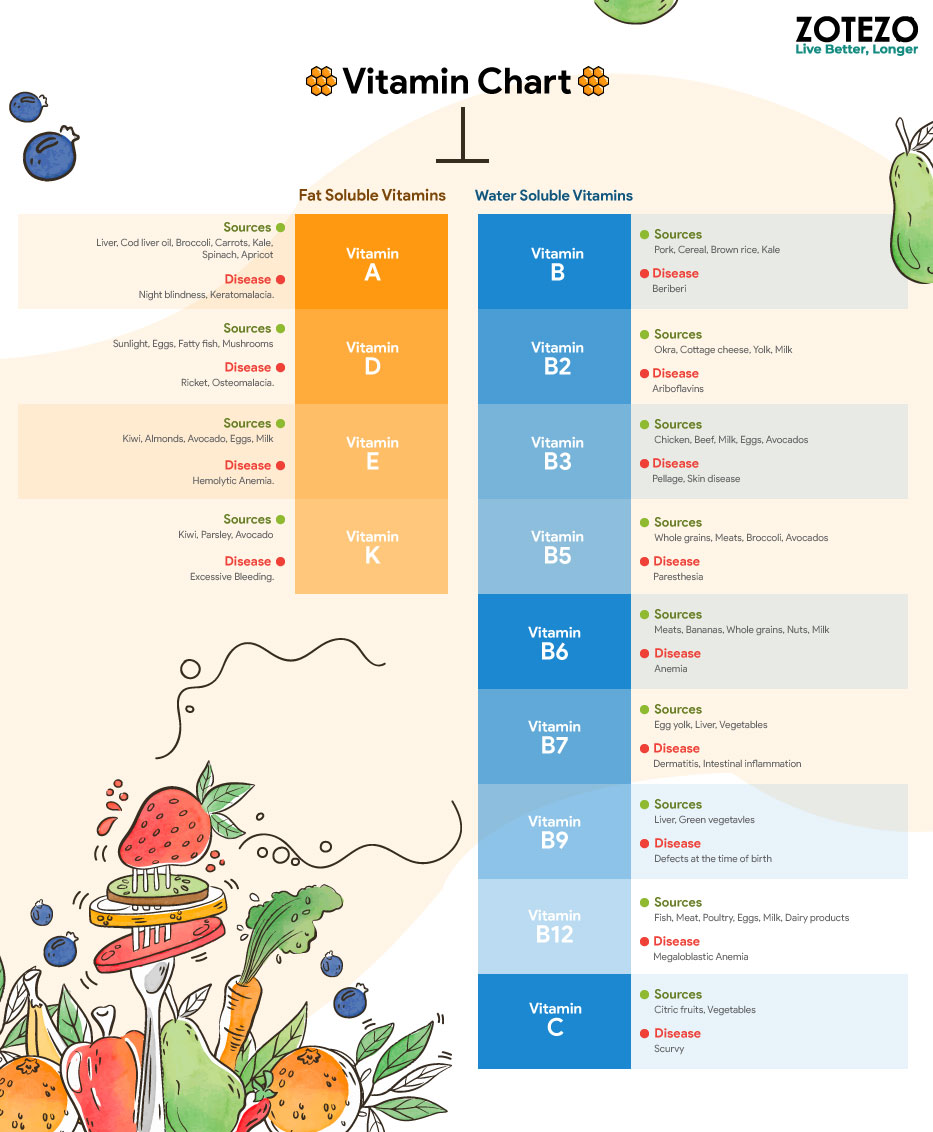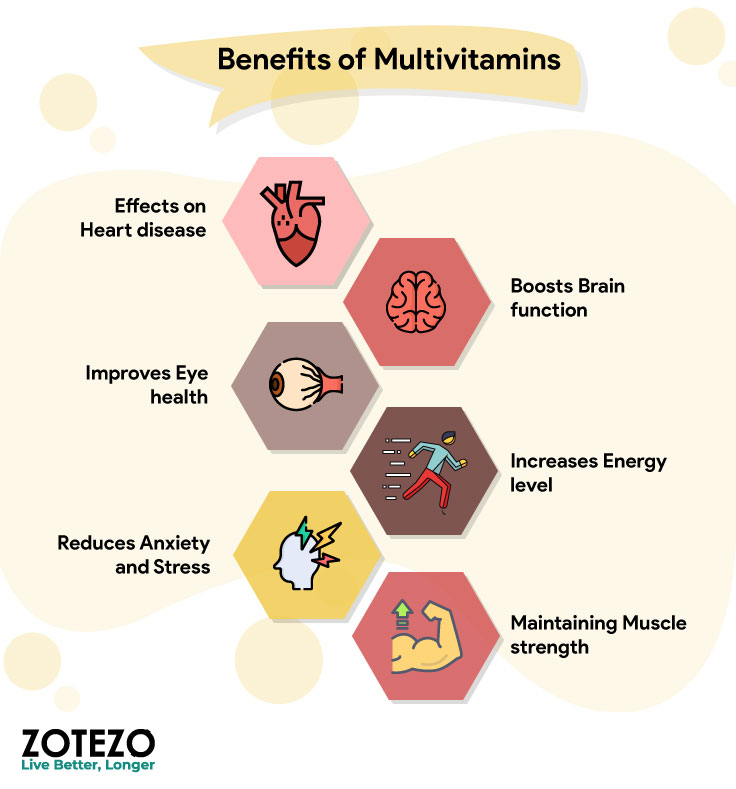Multivitamins: Benefits, Sources, Dosage, and Side Effects

Introduction
Multivitamins are one of the most common supplements in the world.
Over the past few decades, the popularity of multivitamins is increasing rapidly.
People believe that multivitamins can improve health and also reduce the risk of chronic disease and even compensate for poor eating habits. Here in this article, we will tell you everything you need to know about multivitamins.
Avertisement
What is Vitamin?
Vitamins are the essential micronutrient that is needed for the proper functioning of metabolism. Organisms are unable to synthesize these vitamins in the body, thus you need to obtain it through diet. There are 13 recognized vitamins and they are either water-soluble or fat-soluble.
Avertisement
Fat-Soluble Vitamins
Vitamins A, D, E and K are fat-soluble and are stored in the liver and fat tissues of the body. The body can store fat-soluble vitamins more easily than water-soluble ones. These are absorbed with the help of lipids or fats through the intestinal tract.
Vitamin A
A deficiency of vitamin A can cause keratomalacia (an eye disorder that causes a dry cornea) and night blindness. The sources of vitamin A include liver, cod liver oil, broccoli, carrots, butter, kale, pumpkin, spinach, some cheeses, apricot, egg, milk and many more.
Vitamin D
Vitamin D deficiency can cause osteomalacia (the bones become soft) and rickets (weak and soft bone). The main source of vitamin D is sunlight. Vitamin D is also found in eggs, fatty fish and mushrooms.
Vitamin E
Sources of Tocopherol or Vitamin E include Kiwi, almonds, avocado, eggs, milk, nuts, green vegetables, wheat germ, and whole grains. The deficiency of Vitamin E is uncommon, but sometimes it causes hemolytic anaemia (blood cells are destroyed and removed before time) in newborns.
Vitamin K
Vitamin K is essential for blood clotting and its Deficiency of it prevents the blood from coagulating, thus it causes excessive bleeding from normal punctures from the injection or any wounds, blood oozing from gum and nose, and easy bruising. The sources of vitamin K are green vegetables, kiwi, avocado and parsley.
Water-Soluble Vitamins
There are 9 water-soluble vitamins. Vitamin B group (this includes 8 vitamins) and vitamin C. The body can not store water-soluble vitamins and they are excreted rapidly in the urine.
Vitamin B
A deficiency of vitamin B and thiamine can cause beriberi. The sources of vitamin B include pork, cereal grains, brown rice, asparagus, kale and many more.
Vitamin B2
The sources of vitamin B2 or riboflavin include asparagus, persimmons, okra, cottage cheese, yogurt, milk and many more. The deficiency of vitamin B2 may cause ariboflavinosis (symptoms include sore mouth).
Vitamin B3
Niacin or Vitamin B3 may cause pellagra, dermatitis, diarrhoea and mental disturbance. The liver, heart, kidney, chicken, beef, milk, eggs, avocados and others are good sources of this vitamin.
Vitamin B5
The sources of vitamin B5 include whole grains, meats, broccoli, avocado, royal jelly, and fish ovaries. The deficiency of vitamin B5 causes paresthesia (an abnormal skin sensation that includes, tingling, chilling or numbness without any apparent reason).
Vitamin B6
The deficiency of vitamin B6 may cause anaemia (lack of red blood cells and haemoglobin), and peripheral neuropathy (damage to the nerves that carry messages to and from the brain and spinal cord). The sources of vitamin B6 include meats, bananas, whole grains, nuts, vegetables, and milk.
Vitamin B7
The sources of vitamin B7 include egg yolk, liver, and some vegetables. The deficiency of this vitamin causes dermatitis or inflammation of the intestine.
Vitamin B9
Vitamin B9 deficiency during the time of pregnancy can cause birth defects. Leafy vegetables, liver, some fortified grain products, and sunflower seeds are some good sources of vitamin B9.
Vitamin B12
Vitamin B12 or cyanocobalamin is generally present in fish, meat, shellfish, poultry, eggs, milk, and dairy products. The deficiency causes megaloblastic anaemia (where the bone marrow produces large and abnormal red blood cells).
Vitamin C
The deficiency of Ascorbic acid or vitamin C causes scurvy. The sources of vitamin C include citric fruits and vegetables.

What are Multivitamins?
Multivitamins are the most used supplements that have a combination of different vitamins, minerals, and some other ingredients. The nutrient composition of different multivitamins varies with different brands and their products.
Multivitamins are also known as multi-minerals, multiples, or multis and they are available in many forms such as capsules, tablets, powders, chewable gummy candies, and liquids.
You should take multivitamins once or twice a day. Always read the label and follow the instructions before taking any multivitamin supplements. These multivitamins are available in pharmacies, supermarkets, and also online.
Sources of Multivitamins
Your body needs at least 16 minerals and 13 essential vitamins. Multivitamins offer many of these minerals and vitamins in different amounts and forms. Some multivitamins can also contain other ingredients like fatty acids, amino acids, and herbs.
Natural Sources of Multivitamins
We all know, whole foods are generally loaded with nutrients and getting nutrients from foods is way better than getting them from multivitamin supplements.
There are many foods that contain multivitamins and those can satisfy 100% of your daily requirements of nutrients.
1. Kale
Kale is one of the healthiest and most nutrient-dense foods on the planet. It is extremely high in vitamin K and Vitamin C. As we all know, vitamin K is extremely essential for blood clotting and it also plays a major role in maintaining bone health.
21 grams of kale contains 68% of vitamin K and 22% of vitamin C.
2. Liver
The largest internal organ liver is the most nutritious part of any animal. The liver contains many essential nutrients like iron, copper, and folate as well as vitamin A and vitamin B12.
100 grams of liver serves, at least 1200% of recommended dietary intake (RDI) for Vitamin B12 and 600-700% of RDI for vitamin A.
3. Sardines
Sardines are a type of oily and nutrient-rich fish. Sardines are rich in DHA and EPA and omega-3-fatty acid.
92 grams of sardine contains more than half of the RDI for EPA and DHA. It also contains 300% of RDI for vitamin B12.
4. Yellow Bell Peppers
The deficiency of the water-soluble vitamin C causes scurvy. Yellow bell peppers are rich with vitamin C.
186 grams of yellow bell pepper (one large yellow bell pepper) contains 600% of the recommended dietary intake for vitamin C. Even yellow bell pepper harbor up to 4 times the amount of vitamin C than an orange.
5. Cod liver oil
Apart from sunlight, the other sources of vitamin D are very rare. They only include some fatty fish, fish liver oils and egg yolk. Cod liver oil is an excellent source of vitamin D and vitamin A.
14 ml (1 tablespoon) of cod liver oil provides 1400 IU of vitamin D (200% of the RDI for vitamin D) and 270% of RDI for vitamin A.
Daily Doses of Multivitamins
The daily requirements of multivitamins are fully dependent on the amount our body needs to prevent any deficiency disease.
Always take multivitamin supplements as directed on the label or as prescribed by the doctor. The doctor will prescribe you the amount of multivitamins you need according to your weight and muscle-bone density. Do not take more than one multivitamin product at the same time without your doctor’s permission.
There are some multivitamin products that contain minerals like calcium, iron, potassium, magnesium, and zinc. High doses of minerals can cause severe side effects, such as teeth staining, stomach bleeding, increased urination, uneven heart rate, confusion, and muscle weakness.
Take the multivitamin with a glass of water. Remember to chew the chewable tablets thoroughly before swallowing. To intake a sublingual tablet, place it under your tongue and just allow it to dissolve completely. Do not swallow the sublingual tablets whole or chew it. Measure liquid multivitamins with the special medicine cup or dose-measuring spoon.
Also Read : Best Multivitamins in India
Benefits of Multivitamins
There are several benefits of multivitamins. That includes the following advantages.
1. Promotes Heart Health
Cardiovascular disease is the leading cause of death worldwide. Some people believe that taking multivitamins regularly can help to prevent heart disease. Studies suggest that multivitamins are related to a reduced risk of heart attack, strokes or mortality.
2. Boosts Brain Function
Some studies have found that multivitamins help to improve the functionality of the brain in adults. Multivitamin supplements may also improve mood and can reduce depression symptoms.
3. Improves Eye Health
The leading cause of blindness is age-related macular degeneration. Some antioxidant multivitamins and minerals may slow the progression of macular degeneration. Multivitamins may reduce the risk of cataracts.
4. Increases Energy Level
Keeping a healthy lifestyle and taking multivitamins can keep you fit and energetic.
5. Reduces Anxiety and Stress
Regular intake of multivitamins can significantly reduce the level of anxiety and stress. The body uses multiple vitamins to convert food into energy, produce stress hormones and keep the nervous system.
6. Maintaining Muscle Strength
Intaking multivitamins regularly can reduce the damage-causing free radicals and maintain muscle strength.

Who Should Take a Multivitamin?
A regular intake of multivitamins may harm some individuals. However, certain people need to take multivitamins.
1. Older Adults
Vitamin B12 absorption by the body decreases with increasing age. Older adults need more vitamin D and calcium. Intaking multivitamins can help adults over 65.
2. Pregnant and Lactating Women
If you take multivitamins during pregnancy, they can reduce the risk of a number of birth defects. But women should consult a doctor before taking multivitamin tablets as some nutrients are harmful and others are good.
3. Vegans and Vegetarians
Some vitamins like vitamin B12 are only found in animal foods, vegans and vegetarians often lack calcium, iron, zinc, vitamin B group, vitamin D and omega-3-fatty acids.
4. People Having Undergone Bariatric Surgery
Bariatric surgery or surgery to reduce the size of the stomach, can cause broad nutritional deficiencies. People having undergone this surgery need multivitamins to maintain good nutritional status.
Side Effects of Multivitamins
When taking a multivitamin, the dosage is the most important factor. A high amount of vitamins and minerals can be seriously harmful.
The appropriate dose of multivitamins depends on solubility. For instance, for a water-soluble vitamin, the body expels an excess amount. But your body has no easy way to get rid of the fat-soluble vitamins.
If you eat a lot of nutrient-dense foods and take multivitamin supplements, then you can exceed the recommended intake of many nutrients.
- Pregnant women need to be careful before taking any multivitamin containing vitamin A and Vitamin C. As excess vitamin A intake can cause birth defects.
- Smokers should also avoid taking vitamin A and Beta carotene as these can increase the risk of lung cancer.
- A high dose of multivitamins can cause upset stomach, diarrhoea or constipation. Though these effects are generally temporary and disappear when your body adjusts the multivitamin medication.
- Seek immediate medical attention if you notice any allergic reaction like rash, itching, trouble breathing or severe dizziness.
Avertisement
Conclusion
Always remember a balanced diet of fresh whole food is way more beneficial than any supplements. Multivitamins do not provide you with the pass to optimal health. Do not take multivitamins to fix your poor diet.
In fact, the evidence that multivitamins can improve health is not proven. In some cases, multivitamins may cause harm. In the case of a nutrient deficiency, take a supplement for that specific nutrient.
We have tried to tell you everything we know about multivitamins. Did you find this article helpful? Don’t forget to tell us in the comment section.




Responses